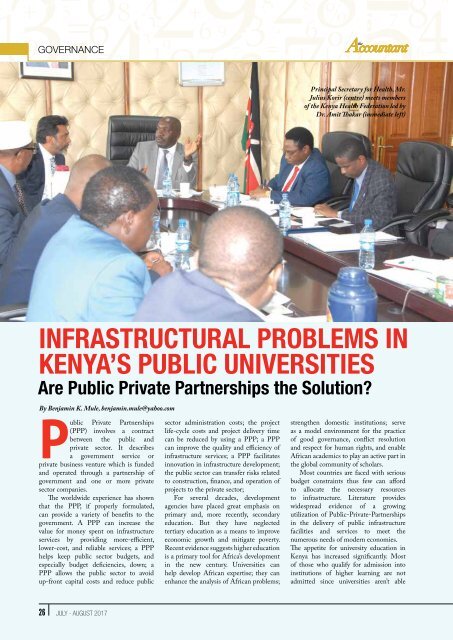The-Accountant-Jul-Aug-2017
Create successful ePaper yourself
Turn your PDF publications into a flip-book with our unique Google optimized e-Paper software.
Governance<br />
Principal Secretary for Health, Mr.<br />
<strong>Jul</strong>ius Korir (centre) meets members<br />
of the Kenya Health Federation led by<br />
Dr. Amit Thakar (immediate left)<br />
INFRASTRUCTURAL PROBLEMS IN<br />
KENYA’s PUBLIC UNIVERSITIES<br />
Are Public Private Partnerships the Solution?<br />
By Benjamin K. Mule, benjamin.mule@yahoo.com<br />
Public Private Partnerships<br />
(PPP) involves a contract<br />
between the public and<br />
private sector. It describes<br />
a government service or<br />
private business venture which is funded<br />
and operated through a partnership of<br />
government and one or more private<br />
sector companies.<br />
<strong>The</strong> worldwide experience has shown<br />
that the PPP, if properly formulated,<br />
can provide a variety of benefits to the<br />
government. A PPP can increase the<br />
value for money spent on infrastructure<br />
services by providing more-efficient,<br />
lower-cost, and reliable services; a PPP<br />
helps keep public sector budgets, and<br />
especially budget deficiencies, down; a<br />
PPP allows the public sector to avoid<br />
up-front capital costs and reduce public<br />
sector administration costs; the project<br />
life-cycle costs and project delivery time<br />
can be reduced by using a PPP; a PPP<br />
can improve the quality and efficiency of<br />
infrastructure services; a PPP facilitates<br />
innovation in infrastructure development;<br />
the public sector can transfer risks related<br />
to construction, finance, and operation of<br />
projects to the private sector;<br />
For several decades, development<br />
agencies have placed great emphasis on<br />
primary and, more recently, secondary<br />
education. But they have neglected<br />
tertiary education as a means to improve<br />
economic growth and mitigate poverty.<br />
Recent evidence suggests higher education<br />
is a primary tool for Africa’s development<br />
in the new century. Universities can<br />
help develop African expertise; they can<br />
enhance the analysis of African problems;<br />
strengthen domestic institutions; serve<br />
as a model environment for the practice<br />
of good governance, conflict resolution<br />
and respect for human rights, and enable<br />
African academics to play an active part in<br />
the global community of scholars.<br />
Most countries are faced with serious<br />
budget constraints thus few can afford<br />
to allocate the necessary resources<br />
to infrastructure. Literature provides<br />
widespread evidence of a growing<br />
utilization of Public-Private-Partnerships<br />
in the delivery of public infrastructure<br />
facilities and services to meet the<br />
numerous needs of modern economies.<br />
<strong>The</strong> appetite for university education in<br />
Kenya has increased significantly. Most<br />
of those who qualify for admission into<br />
institutions of higher learning are not<br />
admitted since universities aren’t able<br />
26 JULY - AUGUST <strong>2017</strong>

















